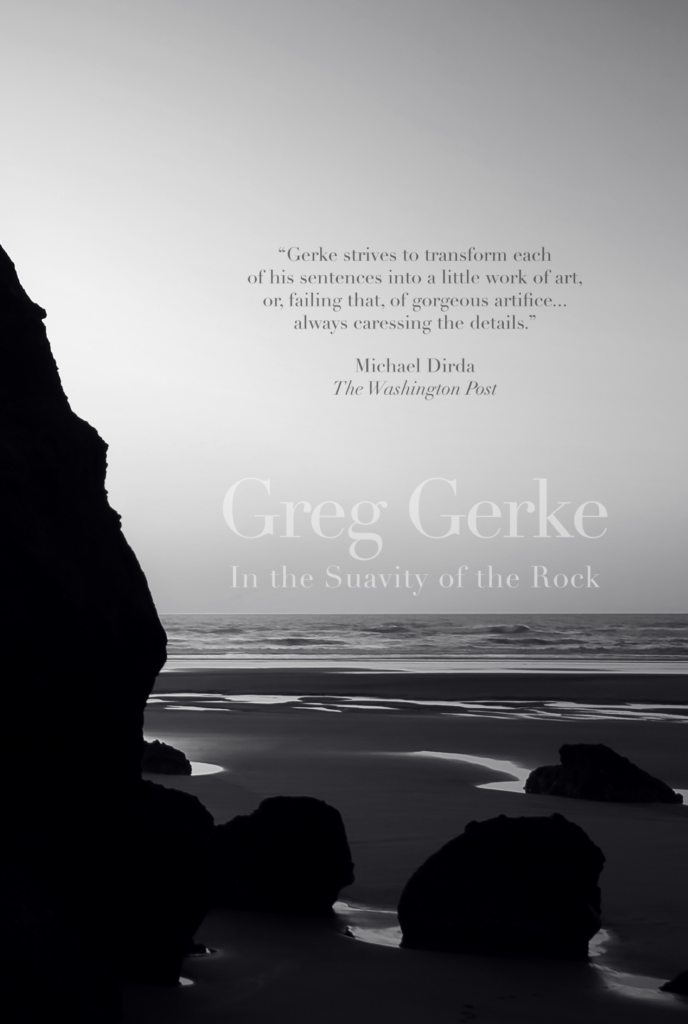
In the Suavity of the Rock
by Greg Gerke
Hardback: £17.99
Paperback: £11.99
ePub: £3.99
Forthcoming on June 28, 2024
Hardback publication limited to 100 copies
Looking back on his earlier selves at a time when all seems lost, a man reflects on a series of abiding memories. But these are not memories of milestones and waymarkers, of the events and experiences that have shaped his life. They are memories of what has occurred in the negative space around his core being—brief encounters, passions thwarted, relationships cut short and desires not pursued—and, in being reflected on, they shape another self that is both powerfully of the world and concealed from it.
In his prismatic début novel, In the Suavity of the Rock, Greg Gerke explores an existential crisis that doesn’t seek to define a stable self so much as to rescue beauty from instability. With the observant eye and intricate style that characterise his acclaimed essays, Gerke probes at an identity disturbed by its own mercurial nature and asks the essential questions of a life conceived in narrative terms: Do we distort our own self-awareness when we select experiences for retelling? Is there true continuity between our past and present selves, or is an identification with the past a way of chaining oneself to it? And might it be the case that a self is not the source of a story? Might it be, instead, that by forcing fluid experience into a story’s form, we manufacture the illusion that our essence isn’t chaos?
About the Author
Greg Gerke is an essayist and writer of fiction, based in New York. His work has appeared in 3:AM Magazine, the Los Angeles Review of Books, Tin House, The Kenyon Review, and elsewhere, and he edits the online literary journal Socrates on the Beach. His story collection, Especially the Bad Things, and a collection of essays, See What I See, are also available from Splice.
Praise for Greg Gerke
A mesmerising exploration of how we depict memory through storytelling, through narration, how memory depicts us through these means, and how, when one puts pen to paper to give voice to memory, what we create becomes something like the memory of memory, aided by the flow of time in its becoming. … Time itself flows through this novel. Time as ruination, as chronicler of existence, as both narrator and the story that it tells. From the primordial pleasures of childhood to the routine of later years, time as one reads it in these pages flows and carves a path to where both reader and protagonist escape, and a path to places one escapes from escaping. Fragmented by the serpentine ways of the mind as it faces itself, nonlinear in its crossing, using the narrator as reflection and echo, the book enthrals from first to last word.
Christina Tudor-Sideri
author of Under the Sign of the Labyrinth and Disembodied
The resistance to artifice becomes an honesty that becomes art and fiction in the sense of something made. Made again and again of not turning away from what art might resist… veering this way and that always toward awkward or elusive or unmanageable truths.
Joseph McElroy
author of Women and Men
To read In the Suavity of the Rock is to turn over and over in your hands the marvel of an object that’s been pressed and rubbed by the impossibility of writing, a Bildungsroman turned on its head. Greg Gerke’s début novel is as sad, wry, and darkly bright as a wet slapped coastline—and as beautiful too.
Jen Craig
author of Panthers and the Museum of Fire
In the Suavity of the Rock is ambitious and wise, full of sinuous intimacies. Greg Gerke maps the intricate appetites of a mind run amok and he does so with unerring lyricism.
Rod Moody-Corbett
author of Hides
The sound of Greg Gerke’s voice is that of the suspended line; the fragment is already begun, and you know where the theory says the line goes: straight on until laughter or mewling or fear or revelation or another of the Consubstantiations. But the mastery of Gerke’s art—and the trust and warmth he builds as a progenitor—is that arrest: What if the ice cream is rage, the nighttime a songbird? “Do you enjoy being enigmatic?” is jocosely asked at one point in the book. But what if the act of measuring—the animacies, the inanimacies and the dark quiet in between—requires it?
Jack Houghteling
author of Sunnyside
